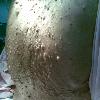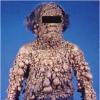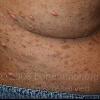

Tags: Neurofibromatosis View |
Tags: Neurofibromatosis View |
Tags: Neurofibromatosis View |
|||||||||
Neurofibromatosis (commonly abbreviated NF) is a genetically-inherited disorder (genetic disorder) in which the nerve tissue grows tumors (i.e., neurofibromas) that may be harmless or may cause serious damage by compressing nerves and other tissues. The disorder affects all neural crest cells (Schwann cells, melanocytes, endoneurial fibroblasts). Cellular elements from these cell types proliferate excessively throughout the body forming tumors and the melanocytes function abnormally resulting in disordered skin pigmentation. The tumors may cause bumps under the skin, colored spots, skeletal problems, pressure on spinal nerve root (Spinal nerve)s, and other neurological problems.
Neurofibromatosis is autosomal dominant, which means that it affects males and females equally and is dominant (only one copy of the affected gene is needed to get the disorder). Therefore, if only one parent has neurofibromatosis, his or her children have a 50% chance of developing the condition as well. The severity in affected individuals, however, can vary (this is called variable expressivity). Moreover, in around half of cases there is no other affected family member because a new mutation has occurred.
Icd10: ICD10Q850q80
Icd9: ICD9237.7
Icdo: 9540/0
Emedicinesubj: derm
Emedicinetopic: 287
Meshid: D017253



